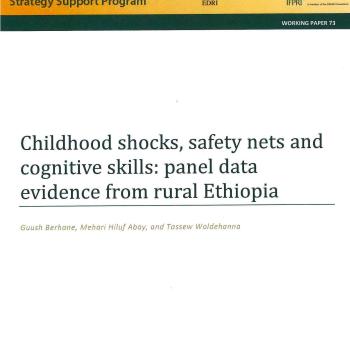Publication Information

A growing body of evidence emphasizes that shocks in early childhood can have irreversible effects on long-term child welfare and poverty. A number of studies have investigated the effects of shocks on child nutrition and health. However, evidence on the effects of shocks in early childhood on child cognition, particularly when measured after the early childhood window during preschool and beyond, is scarce. Given its history of recurring natural and economic shocks, Ethiopia presents a compelling context in which to seek a better understanding of this question. Using child-level panel data from rural areas of Ethiopia, this paper analyzes effects of both economic and non-economic shocks on child cognition skills measured after the early childhood age window.
The identification strategy for the study exploits the timing of shocks that occurred between the two periods in which cognitive scores of children were measured - between 2006, when the children in the study were between 4 and 6 years old, and 2009, when they were between 7.0 and 9.6 years old. Using difference-in-differences analysis and controlling for child, household, and village-level baseline characteristics, we find that exposure to these shocks significantly decreased child cognitive skills. Specifically, exposure to drought reduced child cognitive skills by 0.18 standard deviations, while food price inflation undercut cognitive skills by more than one standard deviations (0.98 due to cereals price inflation and 0.47 due to inflation in meat prices). Divorce contributes to a reduction in child cognitive abilities by another 0.39 standard deviations. On the other hand, the safety net program put in place in 2005 to protect households from the economic effects of such shocks mitigated the reduction in cognitive skills by 0.18 standard deviations. These results are in line with comparable studies from similar contexts and suggest that policies that aim at mitigating these shocks are crucial for child welfare and for future human capital development. The results also suggests that social safety nets, if well designed and implemented, can help check the long-lasting detrimental effects of shocks experienced during early childhood.
Keywords: Shock, safety nets, cognitive skill, children, difference-in-differences, Ethiopia

A growing body of evidence emphasizes that shocks in early childhood can have irreversible effects on long-term child welfare and poverty. A number of studies have investigated the effects of shocks on child nutrition and health. However, evidence on the effects of shocks in early childhood on child cognition, particularly when measured after the early childhood window during preschool and beyond, is scarce. Given its history of recurring natural and economic shocks, Ethiopia presents a compelling context in which to seek a better understanding of this question. Using child-level panel data from rural areas of Ethiopia, this paper analyzes effects of both economic and non-economic shocks on child cognition skills measured after the early childhood age window.
The identification strategy for the study exploits the timing of shocks that occurred between the two periods in which cognitive scores of children were measured - between 2006, when the children in the study were between 4 and 6 years old, and 2009, when they were between 7.0 and 9.6 years old. Using difference-in-differences analysis and controlling for child, household, and village-level baseline characteristics, we find that exposure to these shocks significantly decreased child cognitive skills. Specifically, exposure to drought reduced child cognitive skills by 0.18 standard deviations, while food price inflation undercut cognitive skills by more than one standard deviations (0.98 due to cereals price inflation and 0.47 due to inflation in meat prices). Divorce contributes to a reduction in child cognitive abilities by another 0.39 standard deviations. On the other hand, the safety net program put in place in 2005 to protect households from the economic effects of such shocks mitigated the reduction in cognitive skills by 0.18 standard deviations. These results are in line with comparable studies from similar contexts and suggest that policies that aim at mitigating these shocks are crucial for child welfare and for future human capital development. The results also suggests that social safety nets, if well designed and implemented, can help check the long-lasting detrimental effects of shocks experienced during early childhood.
Keywords: Shock, safety nets, cognitive skill, children, difference-in-differences, Ethiopia

